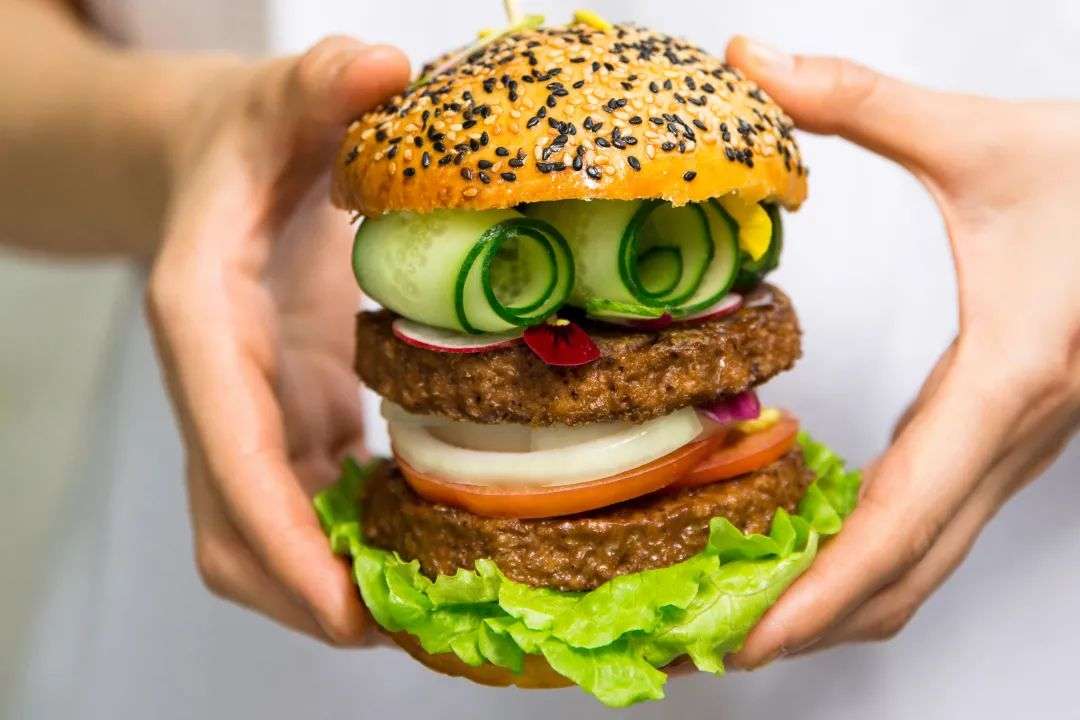One day, it is possible that you ordered a Kung Pao chicken, but did not notice that the chicken is actually made from vegetable meat.
Editor’s note: This article is from the micro-channel public number “geek park” (ID: geekpark), Author: Victoria Peng.
“Many consumers have eaten food made from plant meat, but he himself did not realize that it is not real meat.” said Hong Xiaoqi, founder of the plant meat company Hey Maet , “With the same nutritional content and consistent taste, there is no process of educating the market.”
Not long ago, Hey Maet announced that it had received tens of millions of financing, which was their second financing completed within 4 months. In the past year, the “vegetable meat” track is indeed very hot.
“I don’t think anything will hinder the development of this industry. The population is growing rapidly. We can’t produce enough animal protein (traditional meat) to meet human needs, so this is a very certain trend.” Hong Xiaoqi thinks.
The most traditional grain companies have also felt this change. As the largest unlisted company in the United States, Cargill has a history of 155 years and is also one of the four largest grain merchants in the world. Wang Mojie, head of Cargill’s Asia Pacific alternative protein business, revealed at the 2020 International Future Agri-Food Top 100 Summit held by 35 Dou, “The market size of alternative protein in 2018 is still relatively small. The industry statistics is 1.8 billion US dollars. It is estimated that the global plant protein market will reach US$100-120 billion in 2030.”
Burger with plant meat patties|Image source: Hey Maet
For this reason, Cargill has set up a department in the headquarters, “Use dedicated resources to cooperate with our business around the world, starting with plant-based protein.”
In the face of huge growth potential, in addition to technology startups, many traditional vegetarian companies, soy products companies, and even meat companies have also joined the production of “plant meat”. As a result, in 2020, the amount of financing in the “plant meat” field in the Asia-Pacific region in one year will reach 4.5 times the sum of the previous three years.
“Plant meat” is gradually spreading across various catering channels. In the second half of 2020, KFC, Burger King, GermanyKeshidu has successively put plant meat burgers on shelves, and some net celebrity restaurants also appear plant meat meals. Even supermarkets such as RT-Mart and Hema Xiansheng also put plant meat dumplings and meat patties on shelves.
Moreover, Nestlé’s current CEO Mark Schneider has repeatedly expressed that plant meat is a “needless to say” key layout for Nestlé. It seems that young people will have to choose between plant meat (artificial meat) and real meat in the future.
The “truth” of plant meat
Compared with real meat, the taste of plant meat is a topic that cannot be avoided.
The full name of plant meat is plant-based artificial meat, which is not the same as our commonly known vegetarian meat, such as spicy strips.
Vegetarian food such as spicy strips is usually supported by soybeans and tofu, and most of them have no fibrosis. Plant-based artificial meat uses specialized molecular biology techniques to change the protein structure of plants to replicate the taste of real meat and enhance nutrition. Both have huge differences in raw materials and processes.
“The first money we made after financing was to establish the laboratory. We are currently the first plant meat company in China with an independent and complete technology research and development laboratory.”
What Hey Maet’s R&D team is doing is developing artificial meat based on high-humidity plant tissue protein to overcome the problems of juice, structure, color and taste in the field of plant meat. “We want to produce a cooking experience including In many aspects, plant-based artificial meat that meets or approaches the standard of real meat.”
“Vegetable meat is not only environmentally friendly, but also does not sacrifice the taste of food.” Hong Xiaoqi said, “Vegetable meat can also be well solved without sacrificing the pleasure of people eating. .”
Diaolongbao made with plant meat instead of pork|Image source: Hey Maet
Plant meat can also be used as a condiment. “Our plant meat itself will have a bit of the aroma of that kind of meat, as well as its umami taste. In fact, it can be added to the dishes to play a role in seasoning. Although it is not said that it is completely consistent, it can Play a complementary role.”
In general, plant meat is still gradually approaching real meat in terms of taste, but it has already surpassed in terms of nutrition.
The most prominentYes, plant meat products have the characteristics of high protein, zero cholesterol, low fat, high dietary fiber, and zero antibiotics. For example, compared with ordinary pork, Hey Maet vegetable meat reduces the fat content and 40% calories by 45%, but increases the protein content by 50%
When Unilever launched its “Food of the Future” strategy in November 2020, it even treated plant-based protein-based meat and dairy products as “nutrition-fortified foods.” Achieve 1 billion euros in revenue during the year.
Although plant meat has the advantage of “nutrition fortification”, the charm of real meat is still “rooted”. Just as successful consumer products in history often stem from the rise of new technologies and media, if plant meat wants to enter the public table, what else needs to be seized? In the future, how will consumers welcome plant meat?
The key to entering the Chinese dining table
Tmall data shows that in the 2020s, the sales of light meals category increased by 290% year-on-year. The number of meal replacement consumers has increased by 78% in three years, and the per capita annual consumption has reached more than 3,000 yuan.
Meal replacements are also healthy, low-fat and other characteristics, but plant meat itself has the role of “food ingredients”. The application scenarios of the two are different, which also determines the path to popularization of plant meats and cannot completely copy products such as meal replacements. Ideas.
According to observations, plant meat companies usually enter the consumer market from the B side. By providing customized dishes and ingredients for the restaurant to gradually complete the substitution of meat.
“We will not make a snack brand, because plant meat itself is a healthy concept. But snacks and plant meat are inherently contradictory.”
“Of the several categories of snacks sold, none of them are healthy, such as spicy strips.” Hong Xiaoqi pointed out that putting plant meat on snacks is doomed to the ceiling. Therefore, Hey Maet’s route is very clear, and its initial focus is not on the C side.
For the B-side, plant meat products have better durability and a longer shelf life than ordinary meat, which helps reduce food waste and loss, and it helps restaurants reduce the cost of ingredients.
In addition, for catering businesses, plant meat provides them with a new ingredient and new choice, which can be eaten by meat-eating people and vegetarians. This will not only help bring new customers, but also stimulate some old customers.
“The impact of swine fever last year and the sharp increase in pork prices have had a great impact on catering companies. Even during the epidemic, due to salmon control, some sushi restaurants could only be temporarily closed or even closed down.” Hong Xiaoqi observed.
“We rarely hear that soy and other plant proteins have seen crazy price increases. It will not be troubled by viruses. For merchants, plant meat is more stable in terms of food safety and will not suffer from plagues, hormones and other problems. Trouble. This is also a more reliable source of ingredients.”
“At the beginning, we wanted to use the catering channel, because the track is very large, not that all sub-tracks should be covered.” Hong Xiaoqi believes that the current people who accept plant meat are mainly Kochi or urban people. Mainly, “These people usually don’t cook or eat takeaway at home, so we might as well cooperate directly with the restaurant, and consumers just order directly.”
The future of “have to”
In the future, people may also have to choose to eat plant meat.
Because the meat in China will not be enough in the future. As the world’s largest meat consumer, China eats twice as much meat as the United States and twice as much as the European Union, but the per capita consumption is only half that of others. For example, if everyone in China eats meat like Americans, it needs at least four times the amount.
“From the perspective of large meat products companies, they may not be 100% convinced that plant meat can one day subvert meat products before entering this industry. But considering the cost and current affairs (including swine fever, Sino-US trade ), worried that the price of traditional meat products will increase sharply and there will be a gap. In order to prevent insufficient supply, plant meat products have been launched.” Hong Xiaoqi believes.
According to statistics, China has a shortage of meat supply every year. It is estimated that by 2030, the total meat shortage in China will reach 30 million tons. This also provides a great boost for plant meat to enter the Chinese table.
In addition, Zhu Yuanxin, vice president of BAI Investment, once said that the health wave is irreversible. People not only need to “exercise,” but also try to “eat” to ensure their health and body shape.
In the process of penetrating into the mass consumer market, the “predecessor” meal replacement has also gone through a niche stage of segmented scenarios such as weight management and overtime to satisfy hunger.
As a fresher category, plant meat will inevitably continue to iterate. “We can’t just look at what everyone’s current perception is. For example, a category that didn’t exist before, such as Zihai Pot, is now becoming very popular. We still need to give this new category time to grow.” Hong Xiaoqi said.

